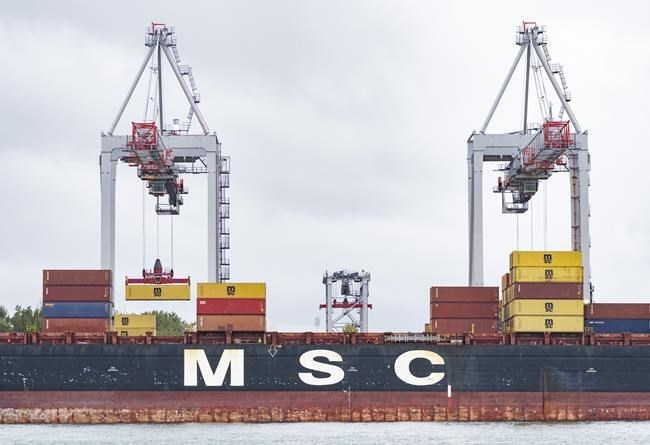MONTREAL — Industry leaders are warning that a bill to ban replacement workers during a strike or lockout could lead to greater disruptions in sectors ranging from aviation to package delivery and internet services — a notion unions reject outright.
Tabled in Parliament on Thursday, the Liberals' legislation would be applicable to federally regulated industries such as air travel, ports, banking and telecommunications and fine companies $100,000 a day for each violation. It would affect roughly a million employees — including at most Crown corporations — about 34 per cent of whom are unionized.
A ban on replacement workers would threaten critical infrastructure and supply chains, said Derrick Hynes, head of industry group Federally Regulated Employers - Transportation and Communications, whose 37 members include Canada's biggest airlines, railways and telecoms.
“During this time of extraordinary strain on the labour relations system, as supply chains continue to recover from the economic ravages of the COVID-19 global pandemic, a replacement worker ban will create an enormous imbalance at collective bargaining tables, incentivizing strike action, with serious negative consequences for Canadians," said Hynes in a news release.
He also cautioned the bill could prolong strikes and give small bargaining units in large companies outsized power to shut down entire operations, pointing to airlines and ports as examples.
However, Canadian Union of Public Employees (CUPE) president Mark Hancock said current rules give management unfair leverage in negotiations by allowing firms to hire outside labour, which can drag out strikes.
Rather than destabilizing labour relations, the proposed rules would result in shorter job actions and compel more attention from bosses to the plight of workers, said Unifor president Lana Payne.
"When you're able to use scab labour, it lengthens the strike," she said in an interview. "When people finally go back to work, it is a toxic, poisonous workplace for a very long time."
CUPE cited ongoing lockouts where outside hands have supplanted union ones for the time being.
Some 214 employees at Quebecor Inc.-owned telecom Vidéotron have been locked out since Oct. 27, while 81 longshore workers at the Port of Quebec have faced a lockout out since Sept. 15. In both cases, replacement workers have allowed management to prolong the bargaining, Payne claimed.
Their deployment also "divides communities by pitting workers against each other,” said Public Service Alliance of Canada president Chris Aylward.
The legislation does not apply to the federal public service and includes exceptions for situations where replacing employees is necessary to prevent threats to public health and safety. Serious property or environmental damage are among the other exemptions.
The bill comes as a resurgent labour movement makes renewed demands for big gains amid high inflation and a low unemployment rate, and after strikes at Canadian ports in 2020 and earlier this year.
That momentum has butted up against the industry backlash that followed a strike by more than 7,400 British Columbia port workers, which halted the flow of goods at 30-plus terminals for 13 days in July.
Business groups called on Ottawa to take action following the dispute, with the Canadian Federation of Independent Business asking the federal government to designate ports as an essential service and scrap its pledge to ban replacement workers — a Liberal election promise from 2021 that New Democrats pressured the minority government to fulfil.
"It looks like Ottawa has not learned any lessons from the most recent strikes at B.C. ports," said vice-president Jasmin Guénette, whose federation represents 97,000 small and medium-sized businesses. He said strikes would happen more often due to the proposed legislation, known as Bill C-58 and introduced last week by Labour Minister Seamus O'Regan.
Quebec has had similar laws on the books since 1977 and British Columbia since 1993.
The goal is to ensure that strikes remain potent "and aren't effectively nullified by the employer," said Margo Young, a law professor at the University of British Columbia.
“The consequences of this legislation are not going to be as dramatic as its opponents threaten," she said in an interview.
However, Wade Sobkowich, who heads the Western Grain Elevator Association, says a ban could hit the grain sector hardest via railway work stoppages, injecting uncertainty into the shipping process.
"Canadian grain is a vital food ingredient around the globe, and a vital source of income for farm families," he said in an email, adding that shippers, farmers and customers will feel the pinch most.
Perrin Beatty, CEO of the Canadian Chamber of Commerce, which represents about 200,000 businesses, argued the bill will see Ottawa "put its thumb firmly on the scales" in favour of unions.
The legislation includes language requiring both sides in a bargaining process to try to reach a consensus on what work must continue in the event of a strike or lockout. Such a deal would need to come within 15 days after notice for collective bargaining is given.
If an understanding isn't reached after 15 days, the Canada Industrial Relations Board would handle the issue within 90 days. And without such a plan, unions will not be able to issue a 72-hour strike or lockout notice.
If the bill passes, it would come into force 18 months after receiving royal assent to give those involved time to change their strategies, and to ensure the labour board is prepared.
This report by The Canadian Press was first published Nov. 13, 2023.
— With files from Ian Bickis in Toronto
Christopher Reynolds, The Canadian Press



